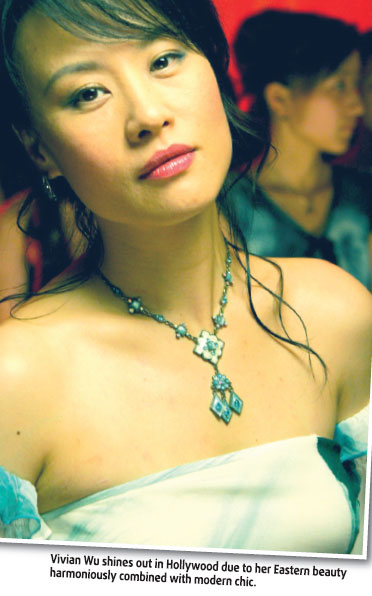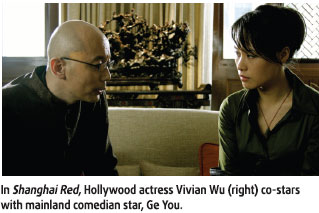 Having captivated Hollywood with her easy grace, veteran actress Vivian Wu wants to share her style secret -- Shanghai.
Having captivated Hollywood with her easy grace, veteran actress Vivian Wu wants to share her style secret -- Shanghai.
The industrious performer has spent almost 20 years mixing with Tinsel Town's glitterati, but Wu's new film, Shanghai Red, puts the focus firmly on her hometown.
In an exclusive interview with BJW, Wu revealed her great pride in hailing from a city she says is synonymous with chic.
"I was born in China, in Shanghai. I love Shanghai so much that I will try my best to promote the stunning culture and fashions of this dynamic city to the world," Wu said.
"During my stay in the US, I found that some foreigners still have little idea about China, even when it comes to Shanghai.
"I hope that one day my movies will generate popular compliments like, 'Wow, you're very Shanghai!' as a synonymy for being stylish and fashionable."
Also known as Wu Junmei, the 40-year-old left Shanghai for the US in 1987, scoring a role the same year in Bernardo Bertolucci's, The Last Emperor. The film scooped nine Oscars, and Wu has rarely been out of the spotlight since.
Named among People magazine's 50 Most Beautiful People in 1990, Wu won memorable roles in such films as Heaven and Earth, Iron and Silk, Pillow Book, and The Joy Luck Club.
Shanghai Red directed by Wu's husband of 13 years, Oscar L. Costo brings her full circle.
Wu's latest project sparked her desire to introduce Hollywood heavyweights to the charms of her Oriental city. Her pitch to directors involved a series of movies portraying modern "Shanghai ladies".
modern "Shanghai ladies".
Wu's character in Shanghai Red is such a woman, albeit with a sinister edge. She plays the classy Hong Meili, whose lust for material things sees her driven to murder.
Wu says the story embodies many aspects of modern Chinese women, and differs from Hong Kong director Wong Kar-wai's more nostalgic movies (In the Mood for Love and 2046).
"This movie is something completely new and set against a background of cross-cultural conflict," she said.
Wu now enjoys legendary status among many of her acting peers, particularly in China.
The daughter of top mainland actress, Zhu Manfang, Wu was born in 1966 and soon followed in her mother's path, appearing in various Chinese television shows as a teenager.
"Acting is where my passion lies," Wu said. "I never expected that this creative and inspiring job would give me so much fun and become such an integral part of my life."
Before landing her big break in The Last Emperor, Wu surprised everyone by taking off to Hawaii to study tourism management at the Pacific University.
She later studied film art at Los Angeles' University of California, and went on to work with respected names such as director, Oliver Stone, and actors, Ewan McGregor and Tommy Lee Jones.
Wu was a guest of honor at 1994's Golden Globe Awards Ceremony, and is now a lifetime judge for the Academy Awards.
Despite such glorious success, she has not lost her humble attitude.
"Balance is very important," she said. "You will have fame and pride there, while you will suffer depression and downside there."
The level-headed actress sees her Chinese appearance as a double-edged sword.
"It works both for and against me. Most Americans, and most American moviegoers, are white people who want to see white middle-class Americans on the screen. Very few go to see art films," said Wu. "Naturally, I would never get a role as Barbra Streisand's daughter. Unless, of course, I played her adopted daughter!
"But at the same time, it's an advantage. I get some really good parts thanks to my Chinese features, and moreover I get to go back to China and get roles of some really big parts." Such roles have included Soong May-ling in The Soong Sisters.
Wu said Chinese film artists still account for only a small proportion of Hollywood's movie community, despite inroads made by the likes of Chow Yun-fat, Jet Li, Jackie Chan, Gong Li and Zhang Ziyi,
"I hope people in the Chinese film industry will be able to benefit more from knowing about the work of their Hollywood counterparts who fully understand how to keep an audience," said Wu.
She recalls her initial struggle to establish a precise identity on arriving in America all those years ago.
"I tried dropping the Chinese and becoming Americanized," Wu said. "I thought that was the point of my coming to America to study and live."
Her epiphany came after five years, when Wu returned to China to make a picture. "The moment I stepped off the plane I knew that in my heart I would always be Chinese."
Today, she is comfortable balancing her cultural divide.
"I'm slowly growing more and more comfortable with my identity as Chinese and American.
"I am a Chinese woman with an American passport and I feel fortunate for the opportunity to live in two worlds in a way that allows me to make the most of both of them."
(China Daily 04/25/2007 page18)